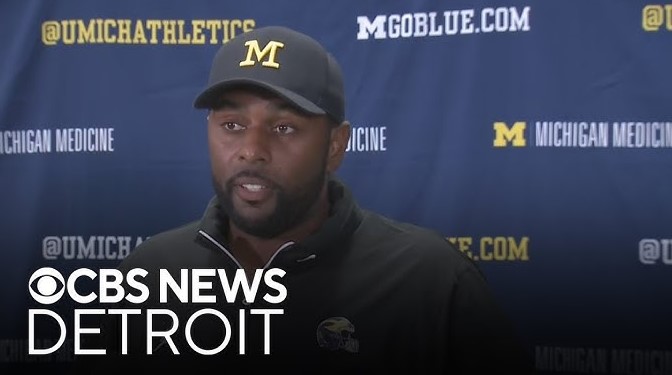
Michigan football’s offense has struggled to generate much production through the air during its first five games of the season. With only 577 passing yards so far, the Wolverines find themselves near the bottom in national rankings for passing offense. Offensive coordinator Sherrone Moore, who also serves as the team’s head coach, recently discussed these struggles during his appearance on the *Inside Michigan Football* radio show. He shared insights into what steps need to be taken to improve Michigan’s passing game and how his coaching staff plans to address the issues.
Moore acknowledged that Michigan’s passing game has lacked efficiency, and emphasized the importance of refining their approach to open up more opportunities for receivers. “I think doing a good job of scheming things and getting people open in various ranges,” Moore explained, highlighting the need for a strategic overhaul. “We’ve got to continue to do that with everybody, and we’ve got to make the right reads.” Moore recognizes that the team’s limited passing output so far has made it difficult to judge the effectiveness of their play-calling, but he remains focused on making necessary adjustments.
One advantage Michigan might have moving forward is the element of surprise. With very little game tape showcasing their passing offense, opponents will have less to analyze when preparing their defenses. Despite the challenge of facing a strong Washington pass defense in their next game, Moore believes his receivers need more chances to make an impact on the field. “They’ve done a really good job of being team players and team ball, but yeah, we’ve got to definitely get them involved,” he said. “They’ve got to do a good job of separation in the pass game when their numbers are called.”
Improving the performance of Michigan’s receivers, according to Moore, will require attention to the finer details of their routes. He emphasized that success in the passing game often comes down to execution at the most granular level. “I think there’s two pieces,” Moore said. “There’s route detail. In every little route, there’s a depth, there’s a release that you’ve got to take. We’ve got to do a better job in that.”
Moore also took accountability for the team’s offensive struggles, acknowledging that the coaching staff has a role in helping the players succeed. “As a collective, we’ve got to make sure we put all those guys in position to run the best routes that they run,” Moore stated. “That will help them, and I think we’re going to be doing that this week.” He stressed that finding success in the passing game will require a collaborative effort from both the coaching staff and the players, each working to improve in their respective roles.
While Moore recognizes the need to improve the passing attack, he remains firm that running the ball will continue to be the identity of Michigan football. He noted that the receivers also play a crucial role in the running game, often helping to create the space needed for effective rushing plays. “There’s times where you gotta push the ball downfield and you gotta do things to create the balance and create the lighter boxes to make sure that you can run the ball when you need to,” Moore explained. Achieving a balance between running and passing will help to keep defenses on their heels, making it easier for Michigan to establish its ground game.
As the Wolverines prepare for their upcoming game against Washington, the focus will be on making the necessary adjustments to the passing game that Moore outlined. Entering their third Big Ten game of the season, Michigan’s schedule is only going to get tougher, especially as they head into Husky Stadium for a challenging night game. With the run game having carried them through tough matchups against teams like Minnesota and USC, it remains to be seen if it will be enough to overcome Washington’s stout defense.
The next game will be a test of whether Michigan can take the steps necessary to enhance their offense, especially in terms of the passing game. Fans and analysts alike will be watching to see if the changes Moore has discussed translate to success on the field.





